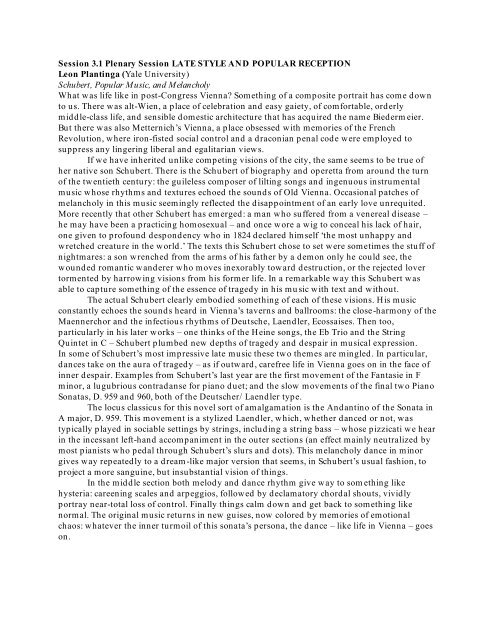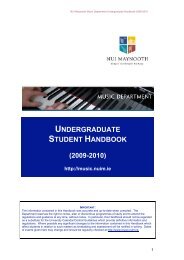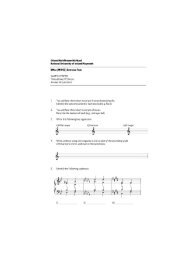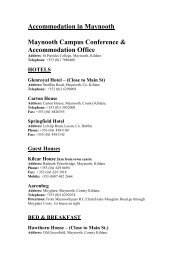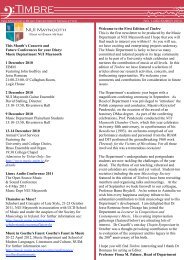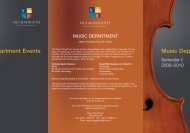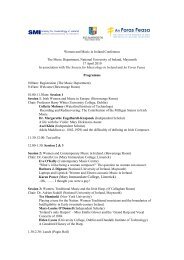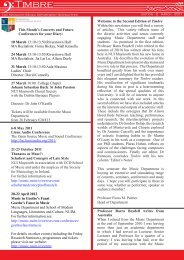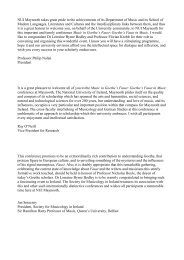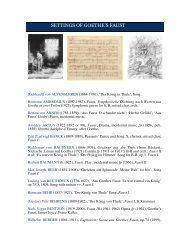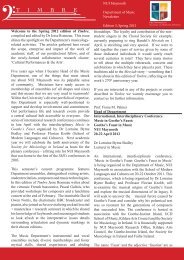Conference Booklet - Music - National University of Ireland, Maynooth
Conference Booklet - Music - National University of Ireland, Maynooth
Conference Booklet - Music - National University of Ireland, Maynooth
You also want an ePaper? Increase the reach of your titles
YUMPU automatically turns print PDFs into web optimized ePapers that Google loves.
Session 3.1 Plenary Session LATE STYLE AND POPULAR RECEPTION<br />
Leon Plantinga (Yale <strong>University</strong>)<br />
Schubert, Popular <strong>Music</strong>, and Melancholy<br />
What was life like in post-Congress Vienna? Something <strong>of</strong> a composite portrait has come down<br />
to us. There was alt-Wien, a place <strong>of</strong> celebration and easy gaiety, <strong>of</strong> comfortable, orderly<br />
middle-class life, and sensible domestic architecture that has acquired the name Biederm eier.<br />
But there was also Metternich‘s Vienna, a place obsessed with memories <strong>of</strong> the French<br />
Revolution, where iron-fisted social control and a draconian penal code were employed to<br />
suppress any lingering liberal and egalitarian views.<br />
If we have inherited unlike competing visions <strong>of</strong> the city, the same seems to be true <strong>of</strong><br />
her native son Schubert. There is the Schu bert <strong>of</strong> biography and operetta from around the turn<br />
<strong>of</strong> the twentieth century: the guileless composer <strong>of</strong> lilting songs and ingenuous instrumental<br />
music whose rhythms and textures echoed the sounds <strong>of</strong> Old Vienna. Occasional patches <strong>of</strong><br />
melancholy in this music seemingly reflected the disappointment <strong>of</strong> an early love unrequited.<br />
More recently that other Schubert has emerged: a man who suffered from a venereal disease –<br />
he may have been a practicing homosexual – and once wore a wig to conceal his lack <strong>of</strong> hair,<br />
one given to pr<strong>of</strong>ound despondency who in 1824 declared himself ‗the most unhappy and<br />
wretched creature in the world.‘ The texts this Schubert chose to set were sometimes the stuff <strong>of</strong><br />
nightmares: a son wrenched from the arms <strong>of</strong> his father by a demon only he could see, the<br />
wounded romantic wanderer who moves inexorably toward destruction, or the rejected lover<br />
tormented by harrowing visions from his former life. In a remarkable way this Schubert was<br />
able to capture something <strong>of</strong> the essence <strong>of</strong> tragedy in his mu sic with text and without.<br />
The actual Schubert clearly embodied something <strong>of</strong> each <strong>of</strong> these visions. His music<br />
constantly echoes the sounds heard in Vienna‘s taverns and ballrooms: the close-harmony <strong>of</strong> the<br />
Maennerchor and the infectious rhythms <strong>of</strong> Deutsche, Laendler, Ecossaises. Then too,<br />
particularly in his later works – one thinks <strong>of</strong> the Heine songs, the Eb Trio and the String<br />
Quintet in C – Schubert plumbed new depths <strong>of</strong> tragedy and despair in musical expression.<br />
In some <strong>of</strong> Schubert‘s most impressive late music these two themes are mingled. In particular,<br />
dances take on the aura <strong>of</strong> tragedy – as if outward, carefree life in Vienna goes on in the face <strong>of</strong><br />
inner despair. Examples from Schubert‘s last year are the first movement <strong>of</strong> the Fantasie in F<br />
minor, a lugubrious contradanse for piano duet; and the slow movements <strong>of</strong> the final two Piano<br />
Sonatas, D. 959 and 960, both <strong>of</strong> the Deutscher/ Laendler type.<br />
The locus classicus for this novel sort <strong>of</strong> amalgamation is the Andantino <strong>of</strong> the Sonata in<br />
A major, D. 959. This movement is a stylized Laendler, which, whether danced or not, was<br />
typically played in sociable settings by strings, including a string bass – whose pizzicati we hear<br />
in the incessant left-hand accompaniment in the outer sections (an effect mainly neutralized by<br />
most pianists who pedal through Schubert‘s slurs and dots). This melancholy dance in minor<br />
gives way repeatedly to a dream -like major version that seems, in Schubert‘s usual fashion, to<br />
project a more sanguine, but insubstantial vision <strong>of</strong> things.<br />
In the middle section both melody and dance rhythm give way to som ething like<br />
hysteria: careening scales and arpeggios, followed by declamatory chordal shouts, vividly<br />
portray near-total loss <strong>of</strong> control. Finally things calm down and get back to something like<br />
normal. The original music returns in new guises, now colored by memories <strong>of</strong> emotional<br />
chaos: whatever the inner turmoil <strong>of</strong> this sonata‘s persona, the dance – like life in Vienna – goes<br />
on.


